On Not Taking Love for Granted
When we’re fortunate enough to find ourselves in love, we should do all we can to cherish this blessing. After all, it seems like many more of us these days are having difficulty drawing this into our lives, so, when it’s present, we should do all we can to preserve and protect this precious commodity. Unfortunately, however, all too often we let incidentals get in the way of giving love its proper due. We may allow insignificant influences to intrude upon our appreciation and enjoyment of its many gifts, letting “the small stuff” get the better of us. What’s worse, though, is that we might end up taking it for granted, assuming it will always be there until one day when we realize it has disappeared – and may never come back. Such are the lessons offered up to us in the hysterical yet not always funny new dark romantic comedy, “The Roses” (web site, trailer).
Theo and Ivy Rose (Benedict Cumberbatch, Olivia Colman) are a pair of successful British professionals living in London. Theo is an accomplished though sometimes-frustrated architect, while Ivy is a gifted chef who’s preparing to seek greener pastures in America. They meet during a chance encounter in the kitchen of the restaurant where Ivy works, and sparks quickly fly. They soon fall madly in love, marry and resettle in northern California, eventually becoming the proud parents of two children, Hattie (Delaney Quinn) and Roy (Ollie Robinson). Life, it would seem, is quite good – prosperous, fulfilling and overflowing with love.
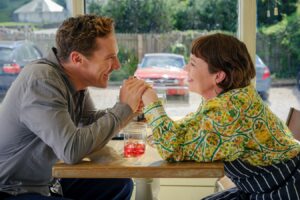
In happy times, the Roses – Theo (Benedict Cumberbatch, left) and Ivy (Olivia Colman, right) – celebrate their good fortune, their good lives and their bountiful love in their comfortable northern California home in the delightful new comedy-drama, “The Roses,” now playing theatrically. Photo by Jaap Buitendijk, courtesy of Searchlight Pictures.
In resettling in America, though, Ivy and Theo have followed different paths. Theo’s career has been steadily rising, while Ivy has become a stay-at-home mom, raising the kids and spending much of her time concocting spectacular culinary creations. However, given her largely domestic lifestyle, Ivy seems to have lost her edge – or at least set it off to the side – in favor of her new role. That’s particularly true when it comes to her passion for setting an inspired table. She still obviously relishes it, but only her family gets to sample her sumptuous wares. It’s almost as if she’s somehow grown underconfident, unsure of her ability to practice her craft for more than just those close to her.
Theo is somewhat troubled by Ivy’s apparent stagnation. He cares for her psychological and creative well-being and wants to do something to help her out. And, as fate would have it, that opportunity comes when he lands a plum contract to design a maritime museum. The commission lands him a generous financial windfall, which, in turn, he gifts to Ivy to fund the opening of her own eatery, an ocean-front seafood establishment she names We’ve Got Crabs.
Business starts off somewhat slow, causing concerns for the viability of the operation among her head waiter, Jeffrey (Ncuti Gatwa), and sous chef, Jane (Sunita Mani). But, as fate would once again have it, circumstances arise that get Ivy noticed, particularly by an influential food critic (Caroline Partridge). Before long, We’ve Got Crabs becomes a sensation, with more business – and hungry customers – than what Ivy knows what to do with.
Ironically, as Ivy’s star rises, Theo experiences just the opposite. A design flaw at the museum is exposed during a storm, causing the building – and his career – to collapse. In a heartbeat, he’s out of work with virtually no prospects for the future. However, Ivy’s newfound success comes to the rescue, enabling her to become the household’s principal breadwinner. And, while her fortunes continue to soar, she trades roles with Theo; he becomes a househusband responsible for tending to the home and raising the children, a venture he initially embraces reluctantly but at which he soon becomes quite adept.

A passion for the culinary arts leads chef Ivy Rose (Olivia Colman, center) to open her own restaurant, which becomes a huge hit thanks in large part to the efforts of her sous chef, Jane (Sunita Mani, left), and her head waiter, Jeffrey (Ncuti Gatwa, right), in director Jay Roach’s latest, “The Roses,” a reimagining of the 1989 comedy classic, “The War of the Roses,” now playing in theaters. Photo by Jaap Buitendijk, courtesy of Searchlight Pictures.
In the ensuing years, Ivy becomes a celebrity chef and restaurateur, opening a chain of new dining outlets across the country. But fame and fortune come with a cost: relations between her and Theo become strained as she lives her dream and he settles for a life that doesn’t meet his needs for creative fulfillment, a growing cause for concern for her. What’s more, Ivy increasingly feels left out of her children’s lives, becoming less connected with them as they’ve grown older (Hala Finley, Wells Rappaport) and have become star athletes in their own right, a part of their lives from which she’s largely removed. What to do?
Ivy decides she needs to devise a way for Theo to feel as fulfilled in his calling as she has become in hers. And, now that she has the money to help make that possible, she returns the favor for Theo having bankrolled her success by financing his ambition of building a home of their dreams on the California coast. Suddenly, Theo is creatively rejuvenated, designing and building a state-of-the-art residence with top-notch amenities and aesthetics, including a spectacular ocean view. In the process, though, Theo starts spending money like a sailor on leave, placing the household’s finances in increasing jeopardy. In addition, he becomes so obsessed with the project that he begins to see it as his house, not theirs.
As this scenario plays out, the couple grows progressively estranged. Petty jealousies turn toxic, with squabbles growing into heated arguments with insults between them flying fast and furious. Others begin to notice as well, such as the kids, Ivy’s restaurant colleagues and the couple’s circle of friends (Kate McKinnon, Andy Samberg, Zoë Chao, Jamie Demetriou, Belinda Bromilow). And, when matters begin to turn violent, it’s obvious that the brimming love that once existed between Theo and Ivy has been shunted off to the side. Clearly, they can’t go on like this, raising the ugly prospect of divorce. Before long, Theo brings his legal counsel (Samberg) on board, while Ivy hires a hardened divorce lawyer, Eleanor (Allison Janney), who’s as vicious as the pet rottweiler she brings with her to the couple’s settlement discussion.
But hopes for a quick and amicable split evaporate immediately when the key stumbling block to arriving at an agreement surfaces: the disposition of the house. Both Theo and Ivy desperately want it – Theo, because he designed and built it as a crowning achievement of his creativity, and Ivy, because she paid for it. Their entrenched positions soon lead to a stalemate that grows ever more embittered and hostile as time passes and they each seek to stake their obsessive claim to the residence.
At this point, one can’t help but wonder, is this what a couple once so much in love has come to, a feuding, nasty pair of combatants who have allowed themselves to be consumed over the possession of a house? Isn’t that rather trivial in the greater scheme of things in comparison to what they once shared? Where did the love go? And why did they let it happen? Those are the key questions posed in this scenario, inquiries that they must earnestly address if they’re ever to reclaim happiness for themselves – let alone with one another – for the future.
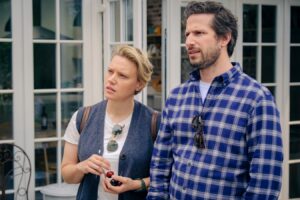
Good friends Amy (Kate McKinnon, left) and Barry (Andy Samberg, right) helplessly stand by and watch the dissolution of the marriage of their good friends, Theo and Ivy Rose, in the insightful new dark romantic comedy-drama, “The Roses,” now playing theatrically. Photo by Jaap Buitendijk, courtesy of Searchlight Pictures.
If Ivy and Theo are to do that, though, they must seriously ask themselves what they want out of life and love, matters that require them to set priorities and examine the beliefs that underlie them, as well as the rationale and justification to support those positions. This is crucial in light of the role that our beliefs play in the manifestation of our existence. It’s unclear whether Ivy and Theo have ever heard of this school of thought, but, considering their natural creative inclinations (and what they’ve produced as a result of them), it would seem that they might have a rudimentary understanding of this way of thinking and its underlying principles. More importantly, however, given the dicey predicament they’ve created for themselves legally, financially and emotionally, it would appear to be in their best interests to embrace this philosophy as a means to get them out of their dilemma and to start building a foundation for the future, whether individually or – dare we say it – together again.
Beliefs are the key in this, especially when it comes to deciding what’s truly most important going forward. Considering where they began, they got themselves off to an impressive start. They managed to create a satisfying life for themselves and their family. So where did they go wrong?
The foundation from where they began was clearly built on their belief in their love for one another, and, as anyone who has been in a successful romantic relationship can attest, that’s essential to make it work. Devotion to one’s partner should be the core principle driving the connection. This calls for paying attention to one another, never taking the other for granted and striving for ways to fulfill the associated needs to make life together happy, fulfilling and rewarding. And, as the film illustrates, the couple manages to do a good job with this, even when circumstances turn problematic. If nothing else, this shows that their underlying bond was quite strong and sufficiently resilient, qualities critical to making a love work and last.
But those nagging incidentals can have a way of devastatingly undermining matters when given too much power over romantic collaborators. When material considerations start taking precedence over emotional concerns, trouble is sure to lie ahead. Given what a gift true love is, one must ask oneself if a home or a business is really more valuable in the long run, especially when it threatens the ongoing viability of the partnership. Focusing on such issues to the detriment of what really matters most can seriously weaken the bond between loving partners. Is that worth it?
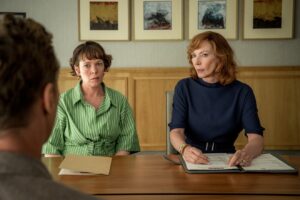
When push comes to shove, a once happily married couple, celebrity chef Ivy Rose (Olivia Colman, left) and her architect/househusband Theo (Benedict Cumberbatch, back to camera) seek to divorce with the counsel of Ivy’s hard-nosed attorney, Eleanor (Allison Janney, right), in director Jay Roach’s new dark romantic comedy-drama, “The Roses.” Photo by Lara Cornell, courtesy of Searchlight Pictures.
While the answer to this question might seem obvious, regrettably, it’s all too easy to allow ourselves to become distracted by these ancillary concerns. By pouring more of our energy and power into beliefs associated with such considerations, we may unwittingly deny these valuable resources to those constructs that, in the end, are more important for the long run. Is that ultimately a wise way to expend our emotional capital, for the manifestation of materializations that are essentially transient compared to what’s far more meaningful and longer lasting? That’s something we need to ask ourselves if we begin placing the small stuff ahead of what truly matters, a realization that Theo and Ivy are about to discover for themselves, an insight that could lead them to tremendous rewards or terrible consequences. In light of that, then, if we’re ever faced with comparable circumstances, we need to determine what’s ultimately more relevant, significant and fulfilling. After all, there’s a lot riding on the decision.
Reimagining a classic film like this can be tricky business, especially when it involves a picture that’s well-liked and well-known. But, with the right team behind such a project, the result can be positively delightful, and such is definitely the case with this reworking of the 1989 dark comedy, “The War of the Roses.” In fact, in this case, I’d even go so far as to say that this new production is actually an improvement over what I see as its often-overrated predecessor. Director Jay Roach’s scathingly biting comedy follows a story similar to its earlier iteration, but important tweaks have been made here to improve upon the Roses’ story and make it better than its forerunner. Nearly all of them are tied to the vastly improved writing at work compared to the original. The scope of the narrative has been significantly enlarged in this version, and all to the better, primarily due to the inclusion of an array of colorful supporting characters and a diverse palette of genuinely sidesplitting scenarios. In addition, the dialogue is crisper, snappier and faster paced, enabling the story to flow more like a screwball comedy than an embittered, often-dour and frequently nasty exercise. That’s not to suggest the lack of an edge in this updated production; quite the contrary. But the pacing, delivery and contents of its inspired and devastatingly hard-hitting one-liners are virtually nonstop, giving the picture a rapid-fire immediacy that its predecessor frequently lacked. Those qualities are further enhanced by sharper character development and the award-worthy spot-on performances of the two leads, whose undeniable chemistry makes their portrayals even more compellingly on target. Add to that the incisive contributions of the film’s fine ensemble (most notably McKinnon, Samberg and an effective but underused Janney), and you’ve got a cinematic formula that truly fires on all cylinders. Admittedly, there are a few narrative elements that could have been handled a little differently (most notably those related to the role of the children in the story), and some aspects of the screenplay feel a little overwritten at times, but these shortcomings are so minor that they’re hardly worth mentioning.
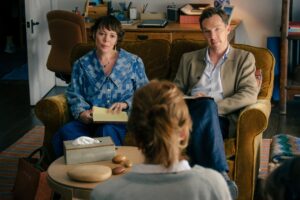
Can couples counseling save the faltering marriage of once-happy partners Ivy (Olivia Colman, left) and Theo Rose (Benedict Cumberbatch, right)? That’s one of many questions raised in director Jay Roach’s new dark comedy-drama, “The Roses,” a reimagining of the 1989 dark comedy classic, “The War of the Roses,” now playing theatrically. Photo by Jaap Buitendijk, courtesy of Searchlight Pictures.
Considering how well everything meshes in this production, I must confess that I’m somewhat surprised that the picture was saddled with a late August release date, typically one of the movie industry’s distribution wastelands. I was also concerned in advance that this could have turned out to be another of those misguided remakes that have come to characterize so many of filmdom’s high-profile releases these days. But “The Roses” delivers the goods across the board and genuinely deserves an appreciative audience for its efforts as one of 2025’s better offerings, especially in the comedy genre. Don’t let preconceptions stand in your way of giving this one a look – you won’t regret it. The film is currently playing theatrically.
Many of us would like to think (or at least hope) that love will last indefinitely. Sometimes it does, sometimes it doesn’t. Ultimately, it depends on what we do with it when it shows up in our lives. If we take the right steps to ensure its continuation, it can endure and flourish. But, if we take it for granted or place higher priorities on other considerations, it can vanish almost as quickly as it often arrives. The experiences of Theo and Ivy Rose thus provide us with a potent cautionary tale about what to do – and what not to do – if we wish to see love persist. It may not call for a Herculean effort, but it does require a commitment to its preservation. And, after all, isn’t commitment what love is ultimately all about? Indeed, without that, what are we left with? Think about that the next time you find yourself alone – and wish you weren’t.
A complete review is available by clicking here.
Film Festival Season Returns!
It’s that time of year again – the return of film festival season, one of my favorite times of year. And, as a member of the Chicago Indie Critics, I’m looking forward to attending three of the Chicago area’s best programs, this time as an official member of the press corps.
First comes Reeling 2025, the 43rd Chicago LGBTQ+ International Film Festival, the second longest-running film festival of its kind, to be held September 19-28 at Chicago’s Landmark Century Centre Cinema and the headquarters of event sponsor Chicago Filmmakers. Reeling’s selections have been getting better by the year, and 2025 appears to be no exception. I’ll be attending quite a few screenings at this year’s festival, and I hope to see you there!
Then comes the 61st Chicago International Film Festival, North America’s longest-running competitive film festival, to be held October 15-26. This event features an array of films from around the world, as well as a number of special events, many featuring appearances by filmmakers, actors and producers from the presented works. This is a must-see event for avid cinephiles.
And, finally, there’s the 31st Gene Siskel Film Center Black Harvest Film Festival, slated for November 7-16. The annual event features a fine selection of short and feature films from African and African-American filmmakers. The event’s programming was outstanding in 2024, and I look forward to what it has in store this year.
Festivals in a number of other locations are scheduled to be held as well. Check local listings in your area for upcoming events. Movie lovers are sure to appreciate these programs, given that many of them feature screenings of pictures that can’t be seen anywhere else. If you love movies as much as I do, you won’t want to miss these events!
Celebrating the Inner Rebel
At the risk of gross oversimplification, nearly all of the world’s residents can be divided into two camps – those who are only too willing to comply with society’s dictates to keep from rocking the boat and those who insist on being themselves, no matter what, even if that means ruffling some feathers and flaunting their uncontainable individuality. Unfortunately, those who fall into the latter camp are often met with staunch opposition, frequently including efforts aimed at stifling their actions, beliefs and behavior, even for the slightest of deviations from conventional expectations. This is especially true during times and in cultures where strict adherence to such rigidly established practices is required and even minor disregard of these strictures is not tolerated. And those who are unable to exercise their personal power to give license to their inner rebels are routinely sanctioned for their actions, conditions poignantly depicted in the new period piece coming of age tale, “We Were Dangerous” (web site, trailer).
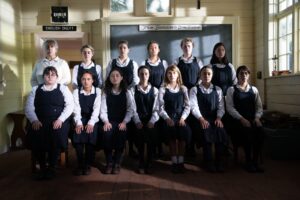
After an incident at a government-run girls’ reform school in 1954 New Zealand, the facility’s head matron (Rima Te Wiata, second row, far left) and a dozen “troublesome” residents were hurriedly relocated to a new home in a former leper colony on a remote island, as seen in the new coming of age comedy-drama, “We Were Dangerous,” available for streaming online. Photo courtesy of Madman Films.
No matter what anyone might suggest to the contrary, generally speaking, girls will be girls, especially during those often-turbulent, rebellious adolescent years, a time when their innate assertiveness and curiosity frequently surface as they come to discover themselves. However, attempts at implementing “correction” to alter such allegedly objectionable behavior are usually unsuccessful, frustrating and infuriating to those responsible for undertaking these efforts. And that outcome was generally even more true in conservative times past, when unwavering conformity was universally expected.
Such was the case in 1954 New Zealand in this film about a government-run girls’ reform school for an assorted collection of young women who had been unreservedly labeled social and sexual “deviants.” The facility, established out of the state’s abundance of concern to help rehabilitate them and alter their supposedly wayward behavior, was firmly committed to the goal of transforming them into proper ladies suitable for marriage and motherhood. This was accomplished by strictly following a three-step program of “Christianize, civilize and assimilate” (with a particularly heavy emphasis on the first step). However, when several residents engaged in behavior that was seen as stepping over the line of acceptability, government officials charged with their oversight came down hard on them and the school’s staff. They believed that both the girls and their caretakers had to pay the price for what happened. And so, in the wake of this “scandalous” incident, a drastic change was hurriedly implemented.
In an effort to prevent future recurrences of such intolerable incidents, a dozen of the facility’s residents and several key staff members were summarily relocated to a remote island that was once a leper colony and home to other assorted misfits and undesirables. Their new home, which had been dubbed the Te Motu School for Incorrigible and Delinquent Girls, consisted of an assortment of rundown cabins in need of extensive repair, a task assigned to the girls upon their arrival. And, when they weren’t doing reconstruction work, they performed an array of chores and attended classes on everything from the three Rs to Bible study to proper womanly etiquette. But, no matter how much work, discipline and schooling the girls were subjected to, the administrators’ hopes for flawless complicity with their demands never quite panned out, transgressions that naturally necessitated various forms of punishment. At some point, though, the impact of such retributive treatment began wearing thin, especially as the residents began tapping into the power of their inner rebels. Of course, such belligerent responses prompted even harsher, more sinister, more disturbing measures that, in turn, led to even more combative resident reactions that carried greater consequences.

A remote New Zealand island that once served as a leper colony becomes the new home of a girls’ reform school after an “unfortunate incident” at the residents’ onshore facility prompted a disciplinary change, as seen in director Josephine Stewart-Te Whiu’s debut feature, “We Were Dangerous,” available for streaming online. Photo courtesy of Piki Films.
Narrated by the school’s stern, calculating, insincere head matron (Rima Te Wiata), the film chronicles the diverse life experiences and backgrounds of the girls, many of which are presented anecdotally and in flashbacks. Some of these incidents are wryly humorous (even if quaintly and wholly archaic by today’s standards), while others are sad, tragic and profoundly unfair. And, as these events unfold and grow progressively more dire, the more troubling matters prompt three of the island’s residents, Nellie (Erana James), Daisy (Manaia Hall) and Louisa (Nathalie Morris), to take cleverly clandestine yet courageously assertive steps to fight back to protect themselves and their peers from a potentially catastrophic and appalling fate. Indeed, there’s no keeping down powerful forces to be reckoned with, as they’re sure to become truly “dangerous” when backed into a corner and their inner radicals are summoned forth.
The terms “rebel” and “radical” often carry questionable connotations. For many of us, they call to mind images of unreliable, untrustworthy troublemakers who are bound and determined to create havoc and spread chaos, upsetting the status quo and yielding outcomes that are often looked upon as undermining “the natural order of things.” And, depending on one’s perspective, that view might be seen as valid. However, because rebels and radicals generally think outside of conventional frames of reference, they also bring new ideas to the table. Granted, those new ideas may not be what many of us are accustomed to, but those notions frequently serve as inspired sources of innovation that simply haven’t yet attained widespread acceptance. One need only look throughout the course of history to see how many technological, social and political inventions got their starts this way. And, in many cases, we have the rebels among us to thank for helping to bring them into being.
This is why suppressing the rebels among us – and within us – can ultimately end up causing more harm than good. Ignoring or squelching their out-of-the-box beliefs could delay or prevent the development of those aforementioned innovations. And, if so, where would that leave us? Because of that, their unconventional outlooks and the intents that emerge from them should be nurtured and encouraged, not dismissed or shoved aside to preserve what could essentially amount to stagnation and a lack of meaningful progress. To avoid that outcome, then, we should celebrate the inner rebel in its efforts to help us discover ourselves, our capabilities and our capacity for creativity. That’s especially true if allowing such developments causes no harm to anyone or anything else; it’s simply a case of making it possible for unenvisioned and unexpressed ideas and aspects of ourselves to surface and to see what they can yield.
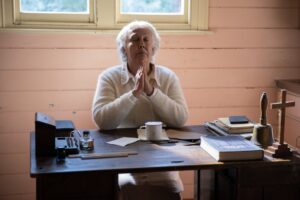
The head matron of a New Zealand girls’ reform school (Rima Te Wiata) follows a strict three-step regimen of “Christianize, civilize and assimilate” in hopes of altering the wayward behavior of the young women under her oversight in the new coming of age comedy-drama, “We Were Dangerous,” available for streaming online. Photo courtesy of Madman Films.
Those bold innovations get their starts with our beliefs, and their importance should not be underestimated in light of the role they play in the manifestation of our existence. It’s unclear how many of the characters in this film (or any of us in general) are aware of this school of thought, but it’s a way of thinking that should not be ignored given what it can ultimately materialize to make our world better, more enjoyable and more fulfilling. And the kind of tolerance called for in this is precisely what the girls in this story need if they are to find themselves and allow their inner beings to blossom into full flower.
The open-mindedness necessary to enable our inner rebels to thrive could ultimately prove useful in fostering the emergence of our innate reserves of creativity and resourcefulness, and there’s no telling what could arise from the expression of such unconventional thinking and beliefs. But, even if they don’t lead to the invention of the next best thing, if nothing else, allowing such radical notions could nevertheless contribute to maximizing our personal satisfaction and enjoyment of life. And why on earth would we want to try and hinder that?
To that end, then, a key question that the gatekeepers charged with containing our rebellious outlooks must ask themselves is, what is to be gained from willfully inhibiting these beliefs and perspectives? This is relevant when it comes to sanctioning some of the behaviors exhibited by the girls in this film. Many of them, for instance, have an interest in rock ʼn roll, which was just beginning to emerge as a new musical form at the time, yet their affinity for it was seriously frowned upon as antisocial and un-ladylike. But, in all honesty, who was being hurt by this? The girls obviously weren’t, as they had an inherent attraction to it. And, as for those around them, how were they being harmed? And what impact, if any, was their interest in this music having on them?
A similar argument could be made over Louisa’s curiosity in same-sex romance. Her innocent exploration of this form of sexuality got her branded as a rebellious deviant when she was still living with her uptight, ultra-conservative family, leading to her immediate expulsion from the household and subsequent transfer to reform school. But, again, who was being harmed by this behavior? And why was it being put down if that was her natural inclination? What impact would her exploration of this aspect of her true self have on society other than possibly removing one potential mother from its future ranks – and perhaps needlessly creating an unhappy soul in the process?
These circumstances, in turn, raise important questions about the overreaching reactions to these behaviors by government officials and school administrators. Why were they so unnerved by them? For all practical purposes, they were responding out of fear, and fear is, in itself, a form of belief. But what was posing such a threat to prompt a fearful reaction like this, and why did they feel so compelled to contain it? Were they afraid this trend would get out of hand? Did they fear that its growth would result in the loss of the lives with which they had grown so comfortable? Or were they afraid that the surfacing of the girls’ inner rebels was reflective of something that might eventually happen to them, too? These conditions certainly gave them much to consider – and to reflect upon, especially when it comes to seeing how easy it is to let molehills needlessly swell to the size of mountains.
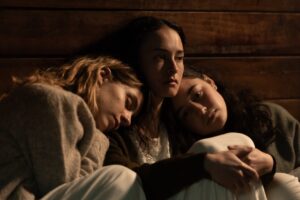
When life at a girls’ reform school becomes increasingly menacing, three of its residents, (from left) Louisa (Nathalie Morris), Nellie (Erana James) and Daisy (Manaia Hall), begin hatching a plan to protect themselves and their peers from a dire fate, as depicted in the new coming of age comedy-drama, “We Were Dangerous.” Photo courtesy of Piki Films.
The foregoing consequences thus illustrate the value in recognizing, understanding and supporting the rebels that likely reside within each of us, be their impact ultimately great or small. We should respect the beliefs that underlie those attitudes and enable them to prosper to reach their full potential. There’s much to be gained and likely little to be lost by doing so, especially since the prospect of danger is probably minimal at best. Indeed, long live the rebel!
Writer-director Josephine Stewart-Te Whiu’s debut feature sheds valuable light on these questions in telling an engaging, economically paced coming of age tale said to be inspired by actual events. The “life at a rigidly run girls’ reform school” storyline might be seen by some as rather episodic, formulaic and even trite, but those shortcomings are handily overcome here by narrative elements that distinguish this particular offering from others of its kind, namely, its superb writing, excellent character development (especially among the residents and colorful supporting cast members), a well-balanced and deftly combined mix of comedy and drama, and gorgeous location cinematography. Then there are the outstanding performances of the ensemble, most notably James, Morris, Hall (who had no prior acting experience and auditioned for her role on a lark), and, most of all, Te Wiata, who delivers a truly award-worthy portrayal. What’s most impressive here, though, is the work of the production’s first-time feature filmmaker, a promising new voice in the field whose initial release bodes well for a bright big screen future. Indeed, “We Were Dangerous” is one of those delightful arthouse gems that has largely flown under the radar but has quietly earned a well-deserved reputation as the inspiring work of a new talent who has managed to successfully knock it out of the park on her first try. Catch this one in limited theatrical release or online; otherwise, report to the matron immediately.
It’s easy to decry the so-called danger of the rebel, but it’s far less common that we celebrate its potential for inventiveness and creativity. And that’s a shame, considering how seriously its possible contributions can be unwittingly sold short. Rather than roundly dismissing the radical, we should take the time to see what it has to say to determine if it offers any meaningful benefit before we take it to task or act on it. Who knows what untapped greatness might reside within its essence if we summarily dispense with it and fail to consider what it might have to offer not only its host, but also the rest of society at large. To do less is truly shortsighted – and a potentially bigger danger than any rebel element might itself ultimately pose.
A complete review is available by clicking here.
The Fragility and Wonder of Memory
Memory is one of those phenomena that makes the human experience unique and captivating. It plays a central role in defining the character of that experience and, in turn, helps us to define our very own individual nature. It provides a sense of continuity and stability, an assumed, seemingly assured knowledge of what constitutes our lives and existence. It fundamentally allows us to believe in what we know and to know what we believe. However, it also possesses an innate fragility, and, when memory – and the underlying beliefs that support it – begins to fail with age, we’re frequently left confused about the essence of our world, an uncertainty filled with fear and a lack of confidence about what lies ahead, a deepening concern that we can no longer comprehend what we previously took for granted. The rules of life that we once embraced without question are now suddenly being cast to the winds, systematically escaping our comprehension. Indeed, this can be a harrowing, debilitating experience, not only for the individuals suffering from this condition, but also for their families, friends and associates who can usually do little other than to just stand by and watch. It’s a scenario sensitively examined in the touching new senior drama, “Familiar Touch” (web site, trailer).

The fading recollections of memory-impaired Ruth Goldman (Kathleen Chalfant, right) have declined to the point where she no longer recognizes her own son, Steve (H. Jon Benjamin, left), as depicted in the touching, sensitive new senior drama, “Familiar Touch,” now available for streaming online. Photo courtesy of Music Box Films.
Eighty-eight-year-old Ruth Goldman (Kathleen Chalfant) is thoroughly convinced she’s aware of everything there is to know about herself and her life. She lives alone but seems fully functional in caring for herself. She even remembers how to prepare her “signature sandwich” when she invites a guest to join her at her home for lunch. But those allegedly unquestioned recollections seem to vanish when her guest arrives, a younger man whom she doesn’t recognize as her son, Steve (H. Jon Benjamin). Instead, she believes he’s a would-be suitor come to pay her a visit, asking him an assortment of questions to which she should theoretically already know the answers, such as what kind of work he does and whether he’s married.
Steve is patient and sensitive in his response, as if he were expecting what transpires. In fact, as soon becomes apparent, he was obviously prepared for what happens, his mother having exhibited behavior like this for some time. However, circumstances have declined to the point where it’s now time for a change. Even though Ruth may still be rather spritely physically, her memory has slid to where she no longer even recognizes her own son. Given that, Steve can’t help but wonder how much longer Ruth would be able to realistically care for herself without cause for concern.
Upon finishing lunch, Steve suggests that they go for a little ride. Ruth happily agrees, although she’s unaware of their destination: an assisted living facility that is about to become her new home. Needless to say, Ruth is perplexed as to why Steve has brought her here. He reminds her that they had visited the facility together once before and that she had said she liked it, approving it as an option for her to move to when her condition made living on her own problematic. She remembers none of this, prompting her to become confused when Steve says his goodbyes and leaves her in the company of her new caretaker, Vanessa (Carolyn Michelle).
Ruth’s adjustment is initially challenging. She feels somewhat indignant at being “unceremoniously” dropped off in this alien location, She’s unfamiliar with her new surroundings (thinking, for example, that the facility’s resident dining room is a restaurant and asking a server to show her a menu) and unaware of the many new strangers now in her life. Admittedly, that could be difficult for virtually anyone, let alone for someone with impaired cognitive abilities. However, as soon becomes apparent, Ruth’s memory is in a greater state of decline than she’s aware of, an indication that her relocation to this facility truly is for her own safety and well-being, even if she doesn’t realize it.

Upon settling into her new home at an assisted living facility, 88-year-old Ruth Goldman (Kathleen Chalfant, left) becomes acquainted with her principal caregiver, Vanessa (Carolyn Michelle, right), in writer-director Sarah Friedland’s award-winning second feature, “Familiar Touch,” available for streaming online. Photo courtesy of Music Box Films.
During her first visit with the facility’s resident physician, Brian (Andy McQueen), Ruth stridently attempts to prove her infallible lucidity by reciting specifics about her life, including a street address in Brooklyn, which turns out to be the home where she grew up, not the California ranch house from which she recently moved. And, one morning not long thereafter, she shows up in the facility’s kitchen ready “for work,” convinced she is about to perform her duties as a food preparer, a job she held years before. In both of those instances, she’s certain in her awareness of who she is, what she does and where she lives, despite the incongruity of these “facts” in light of her surroundings.
As time passes, Ruth slowly comes to terms with her situation, though not without difficulties. While she gradually becomes familiar with her principal caregivers, her fellow residents and her surroundings, she grows reasonably comfortable with her new home, even if she experiences periodic memory lapses. The film follows her as she undergoes these experiences, depicting her reactions, as well as those of her family and the facility’s staff. She may no longer be living the life she once knew, in part because she no longer remembers it and in part because she’s not entirely clear why she finds herself in these new and unfamiliar circumstances. As a consequence, she’s having to shift her outlook and acquaint herself with a new set of beliefs about what constitutes her existence. This is not an easy change by any means. However, Ruth does her best to understand and comprehend the nature of her new reality, how to make the most of it and what drives it, no matter how strange and foreign it may seem compared to what she once believed about her world.
Beliefs play a key role in understanding the nature of our existence given their impact in shaping it. It’s unclear how many of us are familiar with, or have even heard of, this school of thought, and it can be especially difficult to grasp for someone who’s afflicted with the condition Ruth’s experiencing considerung the inherent uncertainty that likely clouds her thinking and beliefs. However, if, like Ruth, we’re to find our way through the maze of an entirely new existence, we must strive to get a handle on our beliefs, no matter what hindrances may stand in our way.

In an attempt to demonstrate her infallible lucidity, 88-year-old Ruth Goldman (Kathleen Chalfant, left) recites the details of her life to Brian (Andy McQueen, right), resident physician at an assisted living facility for the memory-impaired, in writer-director Sarah Friedland’s award-winning second feature, “Familiar Touch.” Photo courtesy of Music Box Films.
As is the case with many of us, we often fail to recognize – either consciously or subconsciously – the role of these powerful and persistent resources in memory formation and retention. But those qualities often play a significant part in terms of which memories last the longest, the strength of these elements frequently enabling their degree of persistence. Consider, for example, Ruth’s recollections of her distant past, which appear to hold on steadfastly. However, for the memory-impaired, this often changes with age over time, with recent remembrances failing to register. Recall tends to become selective, even “random,” with a tendency for recollections that are strongest to be the ones that affected individuals are more likely to retain as others evaporate into the ether.
Why do these memories tend to persist? There could be any number of reasons for this. Aside from these recollections inherently being the strongest (backed by beliefs that, in turn, are also the strongest), their retention could be tied to pleasant experiences from the past. We may well be more likely to hold on to memories if they’re associated with good times. That seems to be the case with Ruth, for example, when she shows up for work in the kitchen, her reporting for duty representing a present-day continuation of a memory-based experience that once gave her great joy and fulfillment.
By contrast, the loss of other memories could be a way of eliminating recollections of unpleasant experiences. For instance, on several occasions, Ruth makes references to her husband, indicating a belief that she’s still married to him, even though he had long since died. Her failure to remember his death could well be related to a desire to rid herself of the beliefs associated with the memory of his passing.
At the risk of playing devil’s advocate, if beliefs are truly employed to preserve pleasant memories and rid ourselves of unpleasant ones, can we truly blame anyone for making use of them in this way (even if subconsciously) in shaping the nature of our existence? Indeed, this may seem like a rather extreme way of managing our memories, but, if this practice provides us with the result we seek, can it truly be faulted? When we consider the pleasantries and unpleasantries involved, it may be seen as a viable solution.

Dressed and ready for work, Ruth Goldman (Kathleen Chalfant) steps into the kitchen at an assisted living facility for the memory-impaired to assume her duties as a food preparer, a job she once held years earlier and believes she still does now, as seen in writer-director Sarah Friedland’s award-winning release, “Familiar Touch.” Photo courtesy of Music Box Films.
This approach to memory management could also be viewed as a way of coping with the onset of age, particularly the loss of mental and physical faculties that often accompanies the aging process. It can manifest in myriad ways, too, such as the introduction of an entirely new sense of self. One’s personality may go through a transformation in which memories of one’s old self disappear almost entirely in favor of something new and surprisingly vibrant. For example, I once knew a memory-impaired elderly woman who was depressed over growing old and frail, but, over time, her personality changed to something new, with a new identity and a completely different outlook on life. Her new persona was characterized by happiness and enjoyment, even leading to the launch of a new relationship with one of her living facility’s eligible bachelors. One might contend that her joyful new existence was certainly preferable to the sad, hopeless outlook she held previously, one that she managed to completely forget in favor of her new perspective.
Of course, when it comes to these approaches, there’s also the collateral damage to be considered. In adopting them, we may not have adequate control over which memories are retained and which ones are lost. Eliminating painful recollections from our existence may help us cope with these distressing memories, but their deletion from our consciousness may also sweep away other, more readily useful remembrances that can leave us lost in addressing matters of everyday life, including those of a highly practical nature. In addition, wholesale lifestyle changes like this can evoke new beliefs, such as fear and confusion, reactions that can produce both immediate results and lingering memories, conditions that can lead to long-term implications.
Taken collectively, these considerations all point to the wonder and fragility of memory, qualities not to be taken lightly. Memory provides us with a sense of continuity about our existence, much of it dependent on what we believe about its nature. But, when our capacity to effectively manage it becomes challenged, that stability and predictability can become lost, potentially making our maneuvering through life frustrating and difficult. This can be especially troublesome when it comes at the end of life, a time when we would like to believe that things should get easier and more manageable – not troubling just to get through everyday activities like caring for ourselves or meeting with family members we no longer remember. No wonder it is often said that we should cherish our memories.
These circumstances thus shine a bright light on the challenges faced by those who care for the memory-impaired. Relatives – especially the children of those affected – often face a difficult time when dealing with family members affected by this condition. In addition to watching their loved ones deteriorate physically, they also witness their cognitive abilities decline, particularly their failure to recognize those close to them. The film illustrates this through the quiet distress Steve experiences as he watches his mother slip away as she becomes a mere shadow of the woman who loved and raised him. Individuals undergoing these ordeals often need just as much support as their relations as they seek to cope with a situation that, sadly, only goes from bad to worse over time (and frequently quite slowly at that).
Thankfully, both patients and their families can be grateful for the support they receive from their caregivers, individuals of remarkable patience and fortitude in their handling of those affected and in providing guidance to their families. “Familiar Touch” pays a fitting tribute to the dedication and diligence of these providers as they do their jobs and serve as rays of hope during one of the most difficult times of life that these individuals and their loved ones will ever go through. The film shows the tremendous levels of compassion and understanding associated with this kind of work, particularly when it comes to frankly but tactfully explaining how caregivers and their patients are each experiencing fundamentally different truths when it comes to the nature of their respective realities, a calling that requires them to be honest and forthright while simultaneously exhibiting a degree of mutual respect, tolerance and acceptance that many of us may find challenging to willingly extend under circumstances like these.

Upon settling into her new home at an assisted living facility, 88-year-old Ruth Goldman (Kathleen Chalfant) seeks to make adjustments to her new way of life, as seen in the touching, sensitive new senior drama, “Familiar Touch.” Photo courtesy of Music Box Films.
Age-related memory loss can be a harrowing, debilitating experience for the individuals suffering from it, as well as their families, friends and associates. And, in this superb new release, writer-director Sarah Friedland examines the various states of mind that the memory-impaired can go through, as well as the array of reactions that they experience in coming to terms with their circumstances. In telling Ruth’s story, the filmmaker expertly shows, rather than tells, viewers what the protagonist is undergoing, driving home the impact of what this heartbreaking condition can yield. At the same time, though, the picture also celebrates all of the little victories that can occur in the course of caring for patients like Ruth, such as those fleeting moments of sparkling recognition, when everything comes back to them, even if only transitory in nature. All of these moments are brought to life with a remarkable level of authenticity, too, having been filmed largely on the premises and in the company of the residents and staff of California’s Villa Gardens retirement community, a facility established 90 years ago by Ethel Percy Andrus, the founder of AARP.
While this release admittedly begins to slow somewhat as it progresses, it generally holds audience interest well without becoming schmaltzy, manipulative or predictable, quite a feat in a story like this, which could easily fall prey to these traits if left in lesser-skilled hands. For its efforts, “Familiar Touch” has been generously rewarded with numerous award nominations and wins at various film festivals, as well as the 2025 Independent Spirit Awards’ Someone To Watch Award for the director. As the population continues to grow old and more of us (especially children of the aged) are left to address scenarios like this, this production presents an excellent look at what those affected might be up against, making for an engaging and informative online watch, one that could provide insights that make a difference when the time comes to make the hard decisions of how to care for those who are no longer able to care for themselves – and when the wonder and fragility of memory becomes all too apparent.
A complete review is available by clicking here.
Copyright © 2025, by Brent Marchant. All rights reserved.










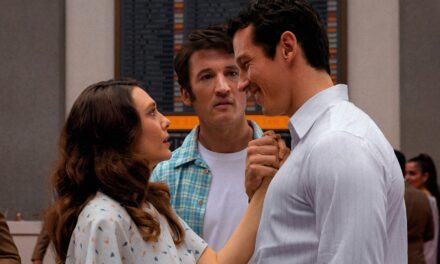
Recent Comments